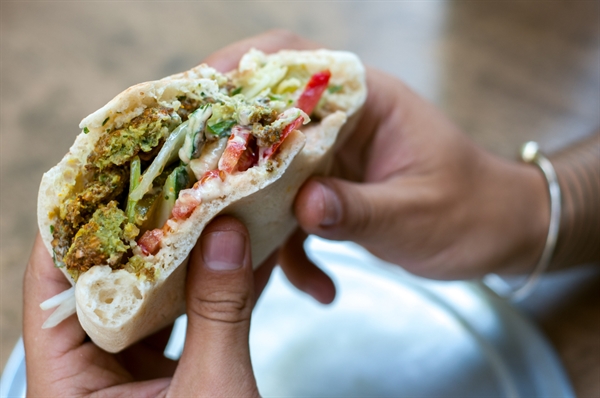Nursing takes plenty of energy under any circumstances, and today’s long shifts mean it is more important than ever to keep your body adequately fueled on the job. Physical labor is only part of the job of nursing. There is also plenty of cognition required: thinking, remembering, calculating, documenting, and decision making. In order to stay on your toes, stay sharp, and avoid dragging (or worse, make mistakes), it is important to make smart choices about what you eat and drink on the job.
Balanced and Complete
During the course of your nursing education, you will have studied some of the fundamentals of nutrition. Let’s assume, then, that you understand the need for a balanced diet with complete nutrition. You will recall, for instance, that your body requires certain essential nutrients and dietary components that the body must have to function properly, which it cannot make on its own.
Examples include the essential amino acids, which together comprise “complete” protein sources. Essential fatty acids are another example; these are the omega-6 and omega-3 fatty acids. The latter are primarily available from seafood such as cold-water fish (e.g. tuna, salmon), or marine-sourced omega-3 supplements. Vegetarians can get some of the omega-3s they need from foods such as walnuts and flaxseed, but they should keep an eye on intake as vegetarian sources are biochemically inferior to marine sources.
You will recall, too, that fats and carbohydrates are also part of a balanced diet. Avoid anything with artificial trans fats, though. These synthetic fatty acids are linked to various adverse effects such as an increased risk of heart disease. Saturated fats, on the other hand, are no longer viewed as direct culprits in heart disease risk. Nevertheless, when on the job, it is probably best to avoid high-fat foods and stick to complex carb-based foods such as whole grains and other whole foods, including cut vegetables, fresh fruit, yogurt, etc.
Avoid Simple Carbs
The goal is to eat foods, including energy-boosting snacks that do not cause sharp surges in blood glucose levels. That means soft drinks are not your friend. Brimming with empty sugar calories that cause sharp spikes in blood sugar, followed by surges in insulin, followed, in turn, by sharp drops in blood sugar levels, these drinks are among the worst diet offenders in any diet.
Unfortunately, “diet” soft drinks are no better. Emerging research suggests they may actually encourage weight gain rather than the expected weight loss, and they probably have effects on blood sugar and hunger-regulating hormones that are yet to be fully unraveled, which brings us to coffee, tea, and water. The latter is, of course, your best bet for safe, natural, healthful hydration. It is important to avoid getting dehydrated on the job so make a habit of drinking cold water throughout your shift. If you are trying to break a soda-drinking habit, consider buying natural sparkling water to replace sugar-laden drinks. It gives some of the same refreshing feel and is far better for you. Green tea features antioxidants linked to certain health benefits, so it is always a good choice. Coffee—whether decaffeinate or regular—is also evidently good for you, according to mounting research.
Many other snacks available to you in hospital vending machines are probably loaded with simple carbs in the form of sugar and refined grains. Keep in mind that simple carbs, which can be thought of as processed, generally white foods such as sugar, flour, potatoes, white rice, etc., are readily broken down into glucose. The rapid release of all that glucose gives you a quick burst of energy, but it comes at a heavy price because you will soon be dragging worse than before as your blood sugar levels plummet almost as rapidly.
Best Foods for Sustained Energy
The best foods for sustained energy are whole grain and other whole foods such as fresh fruits and vegetables, whole-grain energy bars, brown rice, hard-boiled eggs (they’re now considered safe enough in terms of their effects on blood cholesterol to eat one a day safely), and legume-based snacks such as hummus dip.
Sample Recipes
Here are a few simple, energy-sustaining recipes:
Curried Hummus with Veggies
Curry features the wonder spice, turmeric. Scientists all over the globe are studying its active ingredients—known as curcumin—for its alleged ability to protect against various diseases and help preserve brain function. Olive oil is also loaded with potentially beneficial natural antioxidants.
Ingredients:
Peeled carrot sticks
Pre-cut celery sticks
Red or yellow bell pepper slices
2 cans chick peas, drained
2 tbsp. extra virgin olive oil
3-4 garlic cloves
4 tsp. curry powder blendJuice of one fresh lemon
1/2 cup water
Salt, to taste
Directions:
Blend all ingredients in a food processor (or use a handheld blender). Enjoy.
Chickpeas
Chickpeas (aka garbanzo beans) are loaded with heart-healthy fiber and other good nutrients. This recipe yields a handy, highly portable snack you can munch on throughout your shift.
Ingredients:
2 cans garbanzo beans, rinsed and drained
2 tsp. ground cumin
3/4 tsp. salt
1/8-1/4 tsp. cayenne pepper
Dash of onion and/or garlic powder (or one clove minced fresh garlic)
Directions:
Preheat oven to 300° Wrap beans in paper towels and gently roll them around to help remove loose skins. Toss chickpeas with remaining ingredients and arrange on a parchment-lined baking sheet and place in the oven for 1.5 to 2 hours. Stir every 20 minutes.


